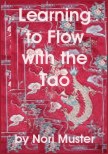
The Book of Changes, the I Ching or Yijing, dates back to 1000 BCE. Four hundred years later, when the Confucian, Taoist, and Buddhist religions were forming, they adopted the I Ching as a seminal manuscript of moral behavior.
The I Ching is composed of sixty-four hexagrams and each hexagram tells a story. The six lines of the hexagram explain the plot and how the characters in the story react. To consult the I Ching, the inquirer concentrates on a question, then chooses a hexagram. The advice in the hexagram often provides insight for the inquirer's question.

I consulted the I Ching for advice on the coming years, and where we go from here. The I Ching gave me Hexagram Nine, "The Power of Small Harvest." In this story, people in a farming region are waiting for the rain to fall. They see dense clouds, but no rain, and there's not much they can do about it.
Given this situation, the subject of the first line, yang, goes about his routine activities rather than worrying about the clouds. This good attitude helps him get through the stressful time. The subject of the second line, yang, notices his positive attitude and does the same. She stops worrying and pays attention to her regular routines. This shows how a good idea can spread.
The third line, yang, shows a married couple having a fight. Their carriage breaks down on the road and they sit there arguing about whose fault it is until they can't stand to look at each other.
The fourth line, yin, shows a woman facing similar unfortunate circumstances. Rather than casting blame or feeling self-pity, she interprets her situation as an example of the inevitable ups and downs of life. This is a good example of rational thinking.
In the fifth line, yang, there's an introspective person, who not only practices patience, but unites with others to infuse joy. This is the highest expression of a positive attitude.
The sixth line, yang, explains the conclusion. The rain falls on the crops and the people who remained patient feel gratitude and joy. Unfortunately, the people who spent their time arguing didn't even notice the happiness others felt. It's easy to understand how people who like to argue and worry will continue with their negative behaviors.
History is full of frustrating problems and mistakes. However, in recent years, for most of us, things seem more intense. We've observed climate events getting worse, but destroying forests and extracting fossil fuels continues. We've witnessed a dangerous trend toward alienation, tracing back to how Covid changed our social lives. We've seen surges of disinformation influence people to join cults or hate groups and give up on civilization and even the concept of reality.
So how do we react? Whether we want to stay in a good state of mind is our decision. In the story of The Power of Small Harvest, the best attitude is to keep up our regular activities and not worry all the time. It also advises us to stop participating in verbal abuse. It's better to keep the faith our loved ones and neighbors will come to their senses when they are ready. We don't need to chivvy them to make them act the way we want.
Joy is the most positive attitude in our situation. Finding joy keeps us connect with what is sacred and holy. Sharing our joy allows us to unite with others. Our American dream is to open the doors to a new reality where people from all backgrounds feel welcome. Not everyone wants this, as we know, but we can't do much about them. The Power of Small Harvest encourages us to stay on track in our own lives and not go around trying to change people because they do not agree with us. The lesson from Hexagram Nine is to meet life's obstacles with patience and flexibility.
This essay originally appeared in Sedona Journal of Emergence, Predictions 2025 & Beyond, Annual Predictions Issue 2024-2025.
Author's bio
Nori Muster is a freelance writer, artist, and adjunct professor at Mesa Community College in Arizona. She has published several books including her memoir, Betrayal of the Spirit: My Life behind the Headlines of the Hare Krishna Movement (University of Illinois Press 1997). Her website is norimuster.com

The 64 Hexagrams of the I Ching: Learning to Flow with the Tao
The I Ching is the ancient Taoist book of metaphors, written to offer guidance in the inevitable changes of life. The I Ching consists of sixty-four hexagrams, the number of combinations mathematically possible with six solid and broken lines. The broken lines "- -" are yin, or passive, dark, yielding. The solid lines are yang, active, light, reaching. Ancient Taoist scholars recorded meanings for each of the sixty-four combinations.
Your future is in your hands. Consult the I Ching for ideas that lead to clear thinking and positive mental attitude. The I Ching teaches you to flow with changes. Create positive change from the inside through conscious living. Take the time to reflect on your attitudes and ideas.
This interpretation of the ancient text I Ching has been online since 2000. Thousands of visitors have accessed the oracle through Surrealist.org. Now it is available at Amazon. Learn to flow with change instead of resist it.
Learning to Flow with the Dao (paperback or e-book) at Amazon.com - click here
I Ching reading (free) at Surrealist.org - click here.
Index